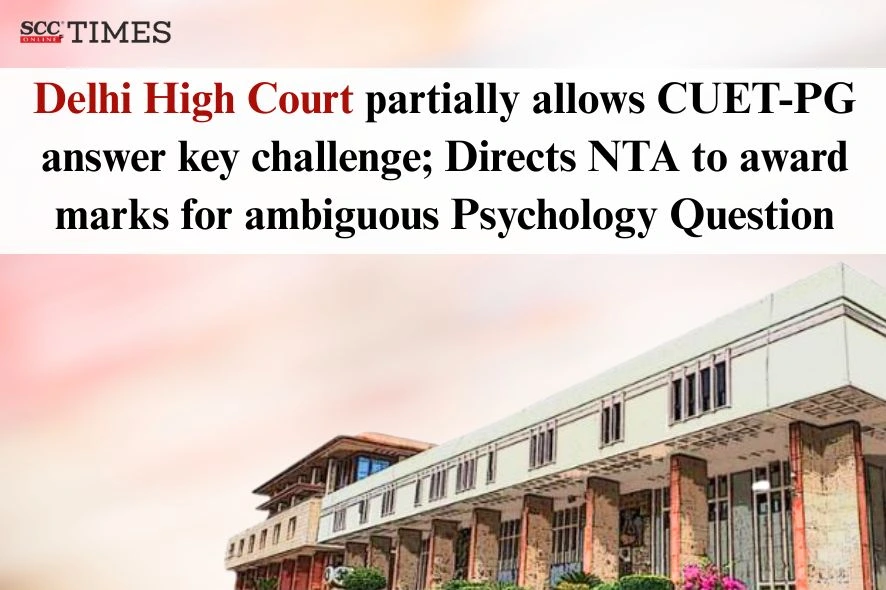Delhi High Court: In a petition instituted by several aspirants who had appeared for the CUET (PG)-2025 examination in Psychology (Paper Code: HUQP20), challenging the correctness of the final answer key published by the National Testing Agency (NTA) in respect of two specific questions, bearing Question IDs: 3016983411 and 3016983415, Vikas Mahajan, J., upheld the final answer of “Proximity” for Question ID 3016983411, rejecting the petitioners’ claim. However, for Question ID 3016983415, the Court accepted that both “Kinesthetic sense” and “Vestibular senses” were valid answers and directed NTA to award five additional marks to eligible petitioners who had selected Option 1 and filed objections within time.
Factual Background
The Common University Entrance Test for Postgraduate courses (CUET-PG) is conducted by the NTA for admissions to various central universities, including the University of Delhi. In the instant case, the petitioners appeared for the Psychology paper and raised objections to two questions post-examination, contending that either the options provided were incorrect or the designated correct option in the final answer key was not academically valid.
The first impugned question (ID: 3016983411) tested the conceptual understanding of perception, and was framed as: “The tendency to perceive two things that happen close together in time as being related is called:” with options being (1) Continuity, (2) Symmetry, (3) Closure, and (4) Proximity.
The final answer key marked “Proximity” (Option 4) as the correct answer. However, the petitioners contended that none of the listed options was correct, and the correct psychological term is “Contiguity”, which was not among the choices. In support, counsel for the petitioners placed reliance on standard psychology textbooks. The second impugned question (ID: 3016983415) asked: “The sense of movement and body position is called:” with answer choices as (1) Kinesthetic sense, (2) Skin senses, (3) Vestibular senses, and (4) Olfactory sense. NTA, in its final answer key, had identified “Vestibular senses” (Option 3) as correct. The petitioners argued that “Kinesthetic sense” (Option 1) was equally valid and supported their case with authoritative psychological literature.
Submissions
During the hearing on 15-07-2025, the petitioners contended that in both questions, the answer key failed to reflect academic accuracy. For Question ID: 3016983411, she argued “Contiguity” was the correct term describing temporal association and not “Proximity”, and for Question ID: 3016983415, she relied on Baron & Misra’s Psychology textbook to argue in favour of “Kinesthetic sense”.
In response, Counsel for NTA submitted that objections received during the stipulated window had been reviewed by subject experts, and the final answer key was based on their recommendation. However, considering the petitioners’ submissions, NTA proposed to constitute a new committee comprising three independent experts in Psychology to re-evaluate both questions. The Court accepted this proposal and directed NTA to place the expert report before it in sealed cover within two days. It was further clarified that the benefit of any revised evaluation would, at that stage, be limited only to those petitioners who had challenged the questions within the permitted time window, namely petitioner 1, 2, 3, 10, 11 and proposed petitioner 15 and 18.
Expert Committee Report and Final Ruling
Pursuant to the Court’s direction in its order dated 15-07-2025, NTA submitted the expert committee report on 18-07-2025. Regarding Question ID: 3016983411, the experts opined that the terms “Contiguity” and “Proximity” are used interchangeably in some contexts and concluded that Option 4, “Proximity”, as stated in the final answer key, was acceptable. Consequently, since none of the petitioners had selected Option 4, the Court held that they were not entitled to any relief for this question.
In contrast, for Question ID: 3016983415, the experts acknowledged that both “Vestibular senses” (Option 3) and “Kinesthetic sense” (Option 1) could be accepted as correct depending on interpretation, and hence the question had more than one correct answer. The petitioners who had selected Option 1, specifically petitioner nos. 1, 2, and 10, and proposed petitioners 15 and 18, were therefore held entitled not only to the four marks assigned to the question but also to be spared the penalty of one negative mark. Thus, a total benefit of five marks was directed to be granted to them.
The Court ordered the NTA to update the revised result of these petitioners on its official website by 20-07-2025. However, it was made clear that the revised results would only entitle them to participate in counselling for the remaining available seats and would not disturb already allotted seats of other candidates.
[Isha Malik v. Union of India, 2025 SCC OnLine Del 5011, decided on 15-07-2025]
[Isha Malik v. Union of India, 2025 SCC OnLine Del 5012, decided on 18-07-2025]
Ms. Rishika Nagpal and Mr. Karan Nagpal, Advocates for petitioner
Mr. Akshay Amritanshu, Sr. Panel Counsel with Ms. Drishti Sarai, Ms. Drishti Rawal and Mr. Sarthak Srivastava, Advs. for R-1/UOI. Mr. Sanjay Khanna, Standing Counsel with Ms. Pragya Bhushan, Mr. Tarandeep Singh and Ms. Vilakshana Dayma, Advs. for NTA. Mr. Parmanand Gaur, Standing Counsel with Mr. Rajat Manchanda, Adv. for UGC


